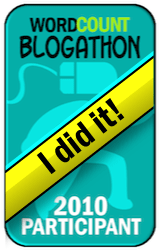The executive director of a national writers' group to which I belong asked members to spread the word about the conference we're hosting next month. I'm on the planning committee so am happy to do that. And I did. I sent out messages via Twitter and to several of my groups on LinkedIn (those I thought relevant). I also e-mailed the message about the upcoming conference to a private group of writers in my hometown.
Suffice it to say, the conference is next month, in New York. I know most people won't be able to attend. But there might be one or two who would consider it. I'm sorry to say one of the first responses I received back (not that I was asking for one, but some people feel they must) went something like this:
"It's way too late now to make plans to go."
Right off the bat, this person complained not only about how late in the day the notice came but also about the cost of going altogether. Before she even had time to consider the idea, she put the conference out-of-reach for herself, suggesting the same for the rest of the group. She also said something about the conference, unfortunately, being the only way to meet the people who can hire you to make a decent living, which she doesn't believe is fair.
Now, those weren't her exact words, but I know her, and I know that she has an unfair attitude toward this particular group. She has this mistaken belief that it's an elite group she might never qualify to join. I wish she didn't think that way. I wish she could see it more as a possibility, should she decide to follow that path. It's certainly not a necessary path one needs to take in order to have a successful writing career. Less than 2,000 writers belong to this group nationally, and that's not because they're the only ones who qualify. Many writers are not in the least bit interested in the group. And I've never used it to get work. I don't even list it in my credits when I pitch a story idea, unless an editor suggests that I should. That's happened...never.
Besides, it's inaccurate for her to think it's too late to make plans to go. Anyone can plan almost any trip at last minute. I'm a chronic last-minute planner myself. It might cost more, yes, but if someone wants to do something or go somewhere, they can figure out a way.
And while it can be an expensive trip, cost is relative. She'd do herself a favor by considering the pros and cons before deciding right off that it costs too much. Economically speaking, you decide to pay for something when you see the benefit. I get that she does not see a benefit, but others might. They might see what I do: You may meet someone who would like to work with you or partner with you. You may make a new friend. You may find an unexpected revenue stream because of the workshops you attend. You may find any number of benefits, but you won't have that opportunity at all if you won't even consider it a possibility.
Anyone who knows anything about networking knows that it takes time to build a relationship. But you have to start somewhere first. A conference is a great place to initiate this. That's yet another benefit.
Finally, she insinuated in her e-mail response that if you don't have the money to attend this conference, you might as well kiss any big-paying assignments goodbye. That's a faulty assumption on her part. Most of the editors I work with I've never met in person and may never meet in person. We don't have time. The editors that I have met at this conference haven't always had work to give me, or they edit magazines or departments I don't even write about. That's not the point. The work I get I get because I pitch ideas that fit the magazine. And I network like crazy--in person, online, by phone. I do it all ways possible. And that's how a successful writer lands assignments at major magazines and publishing houses. It has very little, if anything, to do with a conference of any kind. If, by chance, you can meet an editor in person, that's certainly a good thing. But it's not necessary, either.
I was merely announcing the conference to this group in case anyone might like to know about it. Perhaps they could plan to go next year, if that's what they'd need to do. Perhaps, on the other hand, they might wish to jump and take the chance, despite the last-minute rush. I wish this woman could see the idea as a possibility and not as a roadblock.
I wholey believe that if you put an idea out there, there's magic in allowing yourself to see the possibilities in it. You have nothing to gain by squashing an idea right off the bat.
Let her negative response be a lesson for you:
The next time an idea is offered to you, give yourself time to consider it. Let it become a vision in your head. If it works out, fine. If it doesn't, that's fine, too. But first let the idea become a possibility in your head. See how your gut feels about it. If it's a good fit, you'll find a way to make it happen. If it's not, you haven't lost a thing. But there's no need to respond negatively. That not only hurts you but it may influence someone else--and not in a good way. Give yourself room for possibilities.
That's how you grow a positive attitude.
Friday, March 27, 2009
Subscribe to:
Post Comments (Atom)












No comments:
Post a Comment